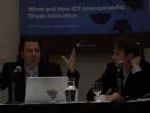eInnovation and ICT Interoperability
The eInnovation and ICT Interoperability Project explores the relationship between innovation and ICT interoperability, seeking to understand the costs, benefits and potential means of achieving the latter.
Focus on interoperability
In a paper published in 2005 by the Berkman Center and sponsored by IBM and Oracle, our colleagues argued that interoperability is the first guiding principle of what it means to establish an “open ecosystem” in Information and Communications Technology (ICT). Following on that study, we determined to explore the relationship between interoperability and innovation in the ICT space. We entered into this project with the general idea that openness and interoperability are generally “good things” that facilitate competition, growth, and innovation, while retaining a healthy skepticism that this was true in all cases.
Three case studies explore ways of developing and sustaining interoperability
While we conducted research into numerous areas of the ICT ecosystem, we have largely based our analysis on three in-depth case studies: DRM-protected music, Digital ID, and Mashups. In each case, we explore several possible ways of developing and sustaining interoperability and assess the potential of each to spur innovation. Through discussions with hundreds of experts, market actors, and other researchers in the field, we have acquired a more nuanced understanding regarding interoperability.
No “silver bullet” to achieving interoperability
There is no “silver bullet” to achieving interoperability, nor is there an optimal level of interoperability that can be applied to all ICT situations. Rather, a case-by-case analysis of the market and incentive structures, technological landscape, and involvement of governments, among other things, is necessary to understand what approaches may be most useful to a given technology or industry. As a policy matter, we tend to prefer open standards processes where they are feasible, but in some cases less broad-based action, such as a market leader releasing technological interfaces or licensing its technology, is easier and more effective in spurring innovation. While we are generally wary of government intervention, we recognize that there are situations where market failures make state action appropriate, usually intervention after the fact to break open legal or market-based bottlenecks that stifle innovation.
This project is supported in part by Microsoft.



